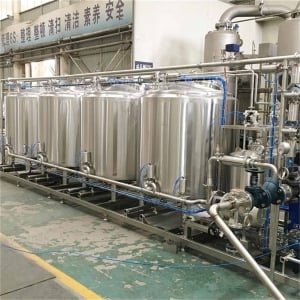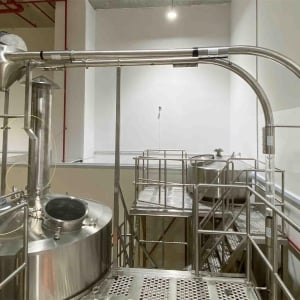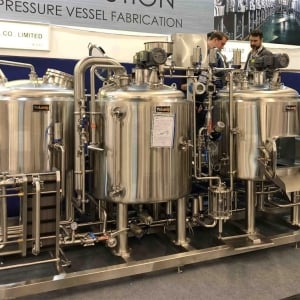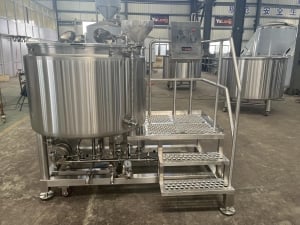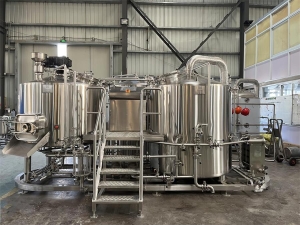Table of Contents
ToggleIntroduction
The craft beer industry has experienced tremendous growth in recent years, with an increasing number of enthusiasts seeking unique and flavorful brews. Behind every great craft beer lies a sophisticated process powered by innovative commercial beer brewing equipment. In this article, we delve into the world of brewing equipment, exploring its significance, types, and the factors to consider when choosing the right equipment for your brewery. Whether you’re a seasoned brewmaster or an aspiring entrepreneur in the beer industry, understanding the nuances of commercial beer brewing equipment is vital to producing exceptional brews consistently.
What is Commercial Beer Brewing Equipment?
Commercial beer brewing equipment refers to the machinery and tools utilized in large-scale beer production. Unlike homebrewing setups, commercial brewing equipment is designed to handle substantial quantities of ingredients, producing large batches of beer for commercial sale. The equipment used in the brewing process directly impacts the quality, consistency, and efficiency of beer production.
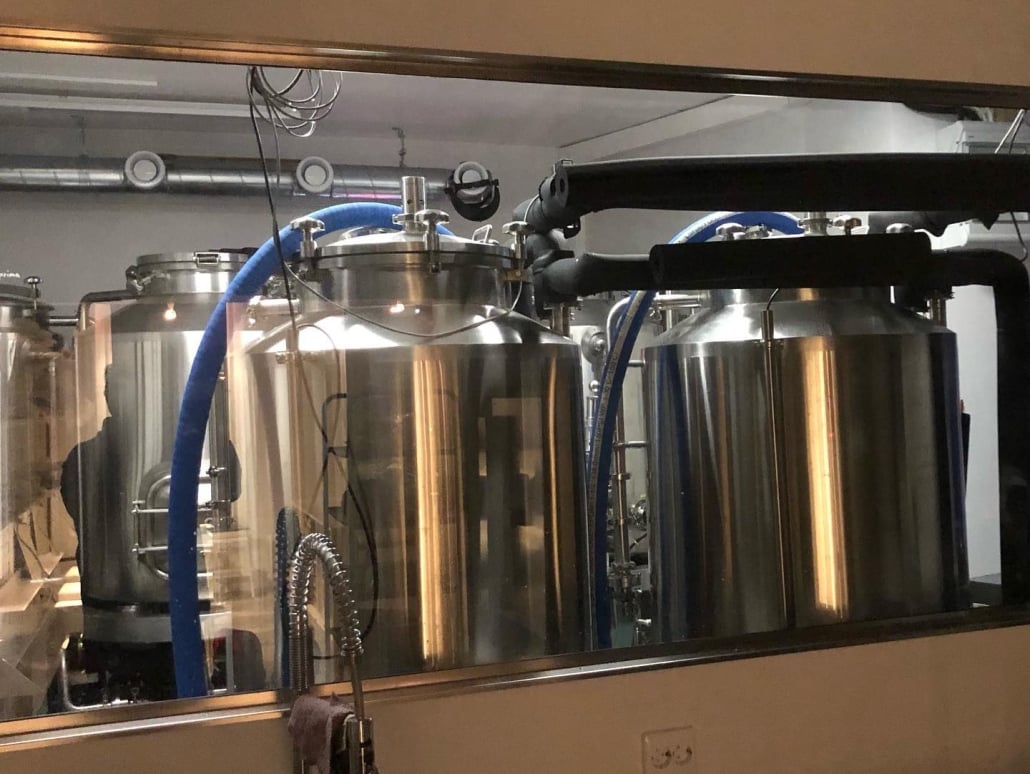
The Importance of High-Quality Brewing Equipment
Ensuring Consistent Quality
Achieving consistent beer quality is paramount for any brewery’s success. High-quality brewing equipment ensures that each batch of beer maintains the same taste, aroma, and characteristics as previous ones, thus creating a loyal customer base.
Maximizing Efficiency
Efficiency is key to maintaining profitability in a competitive market. Commercial beer brewing equipment streamlines the brewing process, reducing production time, and minimizing wastage of ingredients.
Meeting Industry Standards
The beer industry is subject to stringent regulations and quality standards. Employing reliable brewing equipment ensures that your beer meets the required industry standards, adhering to safety and legal requirements.
Types of Commercial Beer Brewing Equipment
Brewhouse Equipment
The heart of any brewery, the brewhouse, is where the actual brewing takes place. It comprises various components, such as mash tuns, lauter tuns, boil kettles, and whirlpools, all working in harmony to convert raw ingredients into wort.
Fermentation Tanks
After the wort is produced, it undergoes fermentation in specialized fermentation tanks. These tanks provide an ideal environment for yeast to convert sugars into alcohol and carbon dioxide.
Bright Beer Tanks
Bright beer tanks are used for conditioning the beer after fermentation, allowing it to mature and clarify before packaging. These tanks are essential for achieving a crystal-clear and flavorful final product.
Wort Chillers
Wort chillers rapidly cool down the hot wort to a temperature suitable for yeast fermentation. They come in various configurations, including plate chillers and immersion chillers.
Filtration Systems
Filtration is crucial for removing impurities and sediment from the beer. Filtration systems help achieve the desired clarity and stability of the final product.
Kegging and Bottling Equipment
Once the beer is conditioned and filtered, it needs to be packaged for distribution. Kegging and bottling equipment allows breweries to package their beer efficiently and hygienically.
Factors to Consider When Choosing Commercial Beer Brewing Equipment
Production Capacity
Determining the production capacity you need is essential when selecting brewing equipment. Consider your current demand and potential growth in the future to avoid outgrowing the equipment too quickly.
Space and Layout
Brewery layout and space constraints play a significant role in equipment selection. Optimize your floor plan to accommodate the equipment efficiently and create a seamless brewing process.
Budget
Investing in commercial beer brewing equipment can be a substantial financial commitment. Set a realistic budget and explore options that offer the best value for your money without compromising quality.
Automation and Control
Automation can streamline the brewing process, reduce human error, and increase efficiency. Evaluate the level of automation and control offered by different equipment manufacturers.
Maintenance and Support
Reliable after-sales support and maintenance services are crucial for keeping your brewing equipment in top condition. Choose manufacturers known for their excellent customer service and technical assistance.
Custom vs. Off-the-Shelf Brewing Equipment
Advantages of Custom Brewing Equipment
Custom brewing equipment allows you to tailor the design to fit your specific brewing process and requirements. It offers greater flexibility and can be an ideal choice for unique brewing styles.
Advantages of Off-the-Shelf Brewing Equipment
Off-the-shelf brewing equipment is readily available and often more cost-effective than custom options. It is suitable for breweries with standard brewing processes and budget constraints.
The Brewing Process with Commercial Brewing Equipment
Step 1: Mashing
During mashing, crushed malt is mixed with hot water in the mash tun to convert starches into fermentable sugars. This process forms the sweet wort, the foundation of the beer.
Step 2: Boiling
The sweet wort undergoes boiling in the brew kettle, during which hops are added for bitterness, flavor, and aroma. Boiling also sterilizes the wort, ensuring it is free from contaminants.
Step 3: Fermentation
The cooled wort is transferred to fermentation tanks, where yeast is added to initiate fermentation. Yeast converts sugars into alcohol and carbon dioxide, producing beer.
Step 4: Conditioning
After fermentation, the beer is transferred to bright beer tanks for conditioning. This stage allows the flavors to mature and the beer to clarify.
Step 5: Packaging
Finally, the conditioned beer is packaged into kegs, bottles, or cans for distribution and consumption.
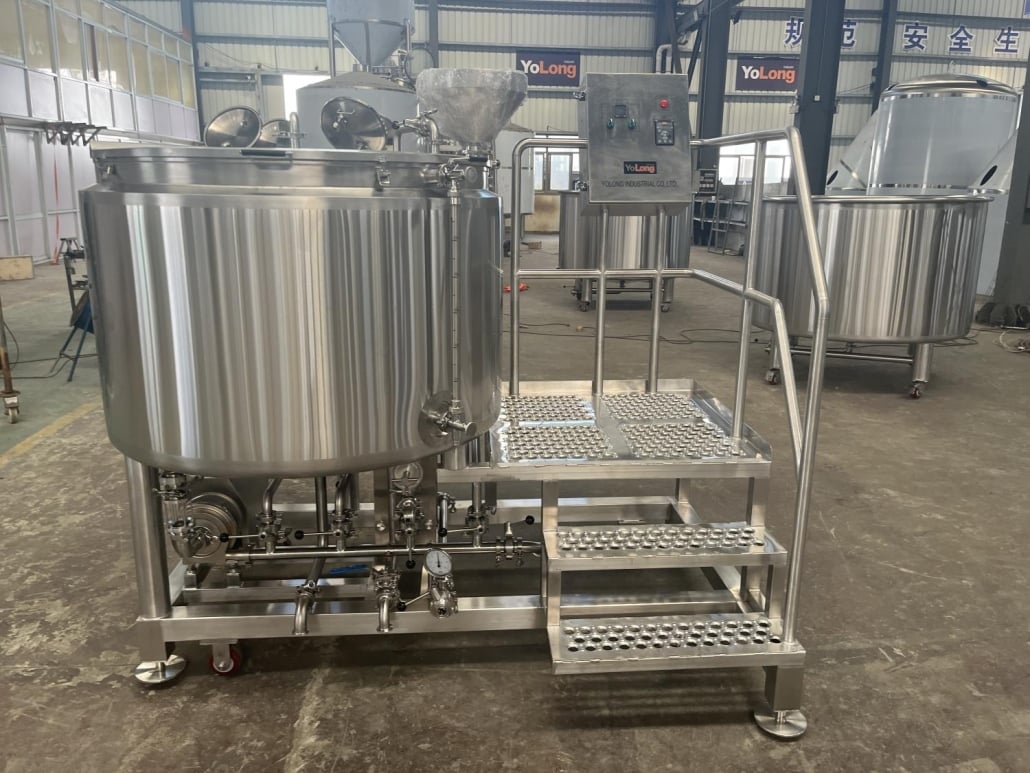
Cleaning and Sanitization of Brewing Equipment
Importance of Cleanliness
Maintaining clean brewing equipment is crucial for producing high-quality and safe beer. Proper cleaning prevents contamination and off-flavors in the final product.
Cleaning Procedures
Develop a regular cleaning regimen for all brewing equipment, including disassembly and thorough cleaning of components.
Sanitization Methods
Sanitizing the equipment ensures the elimination of bacteria and microorganisms that could spoil the beer. Use appropriate sanitization methods and chemicals.
Tips for Maintaining Commercial Beer Brewing Equipment
Regular Inspections
Schedule routine inspections of all equipment to identify any potential issues early on and prevent costly breakdowns.
Cleaning and Maintenance Schedule
Establish a cleaning and maintenance schedule to keep all parts of the equipment in optimal condition.
Repairs and Upgrades
Address equipment issues promptly and consider necessary upgrades to improve efficiency and performance.
Common Challenges with Commercial Beer Brewing Equipment
Contamination Issues
Contamination can lead to off-flavors and spoilage. Implement strict cleanliness and sanitation protocols to prevent contamination.
Equipment Failures
Equipment failures can disrupt production and impact profitability. Regular maintenance can minimize the risk of unexpected breakdowns.
Scaling Up Production
As breweries grow, they may need to upgrade their equipment to handle larger production volumes efficiently.
Innovations in Commercial Beer Brewing Equipment
Automated Brewing Systems
Automation technology continues to revolutionize the brewing industry, allowing for precise control over the brewing process.
Energy-Efficient Equipment
Breweries are embracing energy-efficient equipment to reduce environmental impact and operational costs.
Sustainable Brewing Solutions
Eco-friendly brewing equipment and practices are gaining popularity as breweries strive to be more environmentally responsible.
The Future of Commercial Beer Brewing Equipment
Integration of IoT and Smart Technology
The Internet of Things (IoT) and smart technology will likely play a more significant role in optimizing brewing processes and data management.
Advancements in Material and Design
Innovations in materials and equipment design will lead to more efficient and durable brewing systems.
Conclusion
Commercial beer brewing equipment is the backbone of the craft beer industry, enabling breweries to produce consistent, high-quality brews. Understanding the different types of equipment, the brewing process, and the factors to consider when choosing equipment is essential for any aspiring or established brewmaster. By embracing technological advancements and maintaining equipment with care, breweries can continue to create exceptional beer that delights consumers worldwide.
FAQs
1. How much does commercial beer brewing equipment cost?
The cost of commercial beer brewing equipment can vary widely depending on the size and complexity of the setup. Entry-level systems may start at a few thousand dollars, while larger, more advanced systems can cost hundreds of thousands of dollars.
2. Can I use off-the-shelf brewing equipment for craft brewing?
Yes, many craft breweries use off-the-shelf brewing equipment to launch their operations. It offers a cost-effective and efficient solution for breweries with standard brewing processes.
3. Is it necessary to automate the brewing process?
Automation is not a necessity, but it can greatly enhance efficiency and consistency in large-scale brewing operations.
4. How often should I clean my brewing equipment?
Regular cleaning after each batch of beer is essential, while deeper cleaning and sanitization should be done according to a pre-defined schedule.
5. What are the key trends in sustainable brewing equipment?
Sustainable brewing equipment focuses on energy efficiency, water conservation, and the use of eco-friendly materials to minimize environmental impact.

